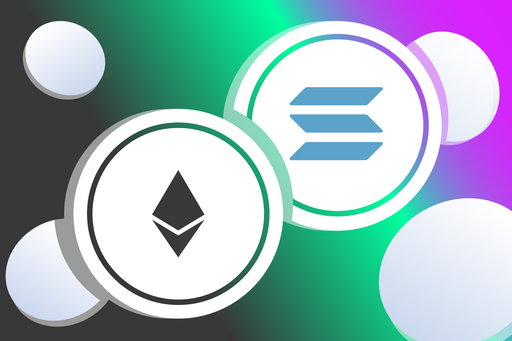
Solana vs. Ethereum: Which Platform is Poised for Mass Adoption?
As digital assets continue to gain traction, the need for efficient, scalable, and cost-effective platforms becomes increasingly important. In this article, we will explore two leading contenders for mass adoption: Solana and Ethereum.
- Published:
- Edited:
Cryptocurrency platforms have been the subject of much discussion over the last few years. As digital assets continue to gain traction, the need for efficient, scalable, and cost-effective platforms becomes increasingly important. In this article, we will explore two leading contenders for mass adoption: Solana and Ethereum. By examining their potential to meet the requirements for mass use, we will assess which platform might achieve mass adoption more efficiently.
Requirements for Mass Use:
- Scalability: To support a large user base, a platform must be able to handle a high volume of transactions efficiently without sacrificing performance.
- Security: Mass adoption requires a platform to be secure enough to prevent hacks and ensure user trust.
- Decentralization: A key aspect of cryptocurrencies is their decentralized nature, which prevents any single entity from having control over the network.
- Cost-effectiveness: Lower transaction costs and energy consumption will appeal to users and encourage adoption.
- Developer-friendly: A user-friendly ecosystem attracts developers, which in turn leads to more innovative applications and increased adoption.
Solana
Scalability: Solana's unique architecture allows it to process up to 65,000 transactions per second (tps), making it highly scalable. This is achieved through its Proof of History (PoH) consensus mechanism, which provides a more efficient approach to transaction validation.
Security: Solana utilizes the same cryptographic techniques found in other blockchain platforms, providing a secure environment for its users.
Decentralization: Solana maintains decentralization through its PoH mechanism and its global network of validators, ensuring a decentralized governance system. Solana is the only other blockchain than Ethereum to have more than one set of validator clients, with a third called Firedancer coming shortly. This should add to the decentralization and robustness of the network.
Cost-effectiveness: Solana's high throughput and PoH algorithm lead to low transaction fees and faster confirmations. This can be an attractive proposition for users and businesses looking for cost-effective solutions.
Developer-friendly: Solana provides developer-friendly tools and a growing ecosystem for building decentralized applications (dApps). The Solana Program Library (SPL) offers a wide range of pre-built tools to facilitate development. Solana is second in active developer count, with over 10,000 applicants in their recent hackathon.
Ethereum
Scalability: Ethereum has historically struggled with scalability issues, with its current capacity limited to around 30 tps. However, the upcoming Ethereum 2.0 upgrade aims to address this issue by implementing sharding and moving to a Proof of Stake (PoS) consensus mechanism.
Security: Ethereum's network is well-established and secure, with a large and diverse base of validators.
Decentralization: As the first platform to introduce smart contracts, Ethereum is highly decentralized, with a broad user and developer base. Additionally, Ethereum is the only EVM chain with more than one set of validator clients, adding to the decentralization of their network.
Cost-effectiveness: Ethereum's current high transaction fees and slow transaction times have been a deterrent for many users. However, Ethereum 2.0 aims to reduce these issues by increasing efficiency and lowering costs.
Developer-friendly: Ethereum has a robust developer community and a rich ecosystem of tools, libraries, and dApps, making it an attractive platform for developers. They currently have the most active developers.
Conclusion
Solana and Ethereum both have strong potential for mass adoption, but their current capabilities and future prospects differ. Solana's high scalability and cost-effectiveness give it an edge for mass use. However, Ethereum's upcoming 2.0 upgrade could significantly improve its efficiency and reduce costs, making it more competitive. However, it will still be far from comparable to Solana's throughput. Ultimately, the platform that achieves mass adoption more efficiently will depend on how well each can address the requirements for mass use and continue to innovate and adapt to market demands.


